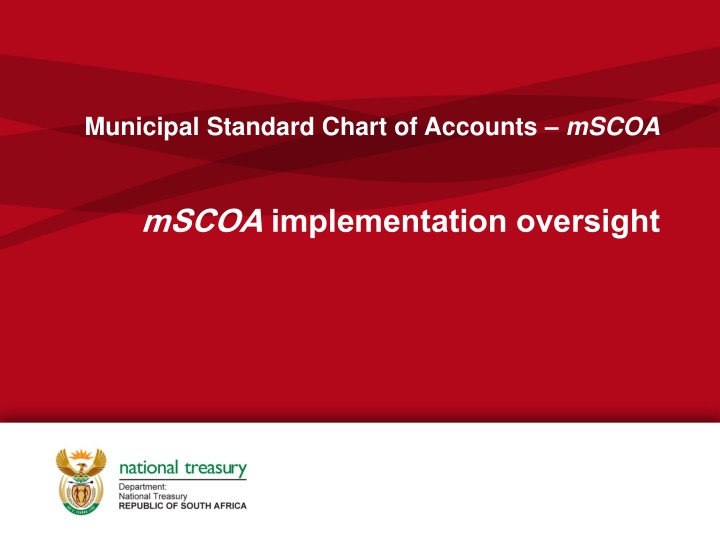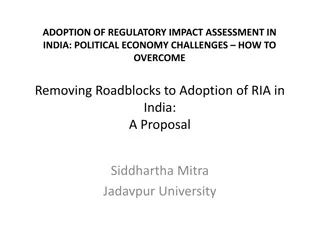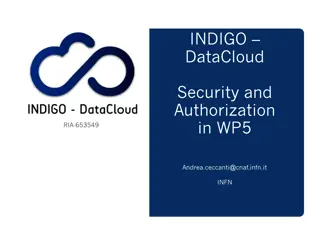
mSCOA Implementation Oversight and Local Government Reform Agenda
Learn about the implementation oversight of the Municipal Standard Chart of Accounts (mSCOA) and the Local Government reform agenda. Understand the background, legislative framework, role of stakeholders, impact, and objectives of mSCOA regulations in standardizing municipal financial information for effective governance and accountability.
Download Presentation

Please find below an Image/Link to download the presentation.
The content on the website is provided AS IS for your information and personal use only. It may not be sold, licensed, or shared on other websites without obtaining consent from the author. If you encounter any issues during the download, it is possible that the publisher has removed the file from their server.
You are allowed to download the files provided on this website for personal or commercial use, subject to the condition that they are used lawfully. All files are the property of their respective owners.
The content on the website is provided AS IS for your information and personal use only. It may not be sold, licensed, or shared on other websites without obtaining consent from the author.
E N D
Presentation Transcript
Municipal Standard Chart of Accounts mSCOA mSCOA implementation oversight
mSCOA implementation oversight Contents Background Legislative Framework The Project Steering Committee The role of Municipal councillors The role of National and Provincial Treasuries Municipal Money Website Impact of mSCOA on IAA 2 2
BACKGROUND 3 3
mSCOA implementation oversight The LG Reform Agenda In October 2008, National Treasury expressed its concern to the Minister of Finance regarding the state of data in local government. As seen in the introduction video, there was a need for a standard Chart of Accounts for municipalities and municipal entities for the following reasons: There was a lack of unified norms, standards and classification frameworks across all of local government. Each municipality (257) used different municipal charts of accounts (COA), making aggregation and comparison of municipal information difficult. Municipalities also continuously changed and amended the detail of their COA inconsistency in information year-on-year impacted on trend analysis. Inconsistencies in reporting, poor data integrity and irregular reporting impacted on the accuracy of information to the legislatures. Financial systems did not meet the financial management and reporting requirements of local government as informed by the legislative framework such as Municipal Budget and Reporting Regulations and GRAP. To address instances of deliberate distortion of reported financial performance by municipalities. 4 4
mSCOA implementation oversight The LG Reform Agenda And then the mSCOA Regulations were promulgated The mSCOA Regulations was regulated on 22 April 2014 by the Minister of Finance. All municipalities and their entities had to comply with the mSCOA Regulations by 01 July 2017, giving municipalities a 3-year preparation period. The objective of the mSCOA Regulations is to provide a national standard for the uniform recording and classification of municipal budget and financial information at a transaction level across all municipalities and financial systems. It is a multi-segmental chart where Local Government information is classified according to project, fund, function, Item, costing and region dimensions to enhance whole of government reporting. Unlike the National and provinces Standard Chart of Accounts (SCOA), municipalities are on accrual-based accounting (vs modified cash) and must plan, budget, report and generate the Annual Financial Statements (AFS) directly in the system. This will facilitate seamless alignment between policy formulation, planning, budgeting, implementation, reporting, monitoring (accountability cycle). 5 5
mSCOA implementation oversight The LG Reform Agenda What is the Local Government Accountability Cycle? 6 6
mSCOA implementation oversight The LG Reform Agenda The IDP (unlimited needs and wants) must directly inform the formulation of the budget (limited basket of resources) Five-year strategy IDP Three-year budget Budget to directly inform transactions and in-year reporting as per Section 71 & 72 of the MFMA Budget Annual implementation plan SDBIP Implementation monitoring - In-year reporting Annual Financial Statements Accountability reporting Incorporation of GRAP Improved standardisation Improved audit process Consistent comparability across all municipalities Annual report Oversight report Accuracy of information depends on: Organisational structure aligned to basic services Sound municipal policies, processes and procedures Standard chart of accounts for municipalities Standard Chart of Accounts Improved Service Delivery 7 7
mSCOA implementation oversight The Legislative Framework mSCOA is underpinned by the following legislation: The Constitution of South Africa, Act No 7 of 1996 Local Government: Municipal Finance Management Act, (MFMA), Act No. 56 of 2003 The Municipal Budget and Reporting Regulations,(MBRR,) 2009 9 9
mSCOA implementation oversight The Legislative Framework Section 216(1) of the Constitution states that: National legislation must establish a National Treasury and prescribe measures to ensure both transparency and expenditure control in each sphere of government, by introducing a) Generally recognised accounting practice as issued by the Accounts Standard Board; b) Uniform expenditure classifications - The Municipal Standard Chart of Accounts (mSCOA) Regulations prescribe these uniform expenditure classifications; and c) Uniform treasury norms and standards which includes MFMA, Regulations, Circulars and Guidelines 10 10
mSCOA implementation oversight The Legislative Framework Local Government: Municipal Finance Management Act (MFMA): Section 5(1)(c) of the MFMA states that the National Treasury must enforce compliance with the measures established in terms of section 216 (1) of the Constitution and the MFMA. In terms of Section 5(2)(d): National Treasury may investigate any system of financial management and internal control in any municipality or municipal entity and recommend improvements. Section 168 (1) of the MFMA further states that: The Minister (of Finance), acting with the concurrence of the Cabinet member responsible for local government, may make regulations for, among other things (a) any matter that may be prescribed in terms of this Act. (b) Financial management and internal control (c) any other matter that may facilitate the enforcement and administration of the Act 11 11
mSCOA implementation oversight The Legislative Framework The Municipal Budget and Reporting Regulations (MBRR): The MBRR provide for the formalisation of norms and standards to improve the credibility, sustainability, transparency, accuracy and reliability of municipal budgets. The prescribed budget formats provide the framework for the identification of the categories of municipal financial and non-financial information required in developing municipal budgets. 12 12
mSCOA implementation oversight The Legislative Framework Municipal Regulations on Standard Chart of Accounts (mSCOA) The Minister of Finance has, in terms of section 168 of the MFMA and acting with the concurrence of the Minister of Cooperative Governance and Traditional Affairs, promulgated the mSCOA Regulations on 22 April 2014 (Government Gazette No. 37577) The mSCOA Regulations are not limited to a standardised financial classification but incorporates: Modernisation of Local Government business processes (regulation of minimum business processes and system specifications); Application of basic processes and procedures for the daily operation of the municipality; and Improvement of the municipal Information Communications and Technology (ICT) and control environment. 13 13
mSCOA implementation oversight The Legislative Framework Minimum business process requirements Section168 of the MFMA states that the Minister may, by notice in the Gazette, determine minimum business process requirements for municipalities and municipal entities to enable implementation of regulations 4 and 5. Minimum system requirements Section 168 of the MFMA further stipulates that the Minister may, by notice in the Gazette, determine the minimum system requirements for municipalities and municipal entities to enable implementation of regulations 4 and 5. The minimum business process and system requirements is not Regulated as yet and MFMA Circular No 80, dated 08 March 2016 is providing further guidance in this regard. 14 14
BENEFITS Of mSCOA 15 15
mSCOA implementation oversight Benefits of mSCOA Improved quality of information for budgeting to allow for informed decision making by management. Improved oversight function by Council as the required information will be tabled for policy decisions, tariff modelling, unfunded mandates and monitoring. Ensure alignment and implementation of the IDP as all expenditure, both capital and operating, will be driven from a project perspective. Improved measurement of the impact on service delivery in the community through the Regional Segment. Less reporting fatigue and lower cost of reporting as various stakeholders can now obtain reports in the formats, they require from the LG Database and there is therefore less need for the use of consultants to augment capacity constraints. Modernised financial management through updated systems and technology. Enables pro-active and preventative support from national and provincial government because of the availability of credible, reliable and timely municipal information. Provides for evidence-based financial management in municipalities. This means improved municipal benchmarking, policy making and interventions. Improves the audit process in municipalities. 16 16
WHO IS RESPONSIBLE FOR mSCOA IMPLEMENTATION OVERSIGHT? 17 17
mSCOA implementation oversight Background The effective implementation of mSCOA at a municipal level depends largely on the efficiency of the oversight structures in place to oversee and report on the implementation. In a mSCOA environment, these governance structures include: o The Project Steering Committee o Audit value chain o Municipal councillors o National and Provincial Treasuries Governance in a mSCOA environment involves the oversight and alignment of Processes Systems People The legal and policy framework and optimisation and improvement of processes reducing red tape Integrated systems to automate business processes. Availability of skilled staff to perform the work 18 18
mSCOA implementation oversight Project Steering Committee Each municipality should establish a mSCOA Project Steering Committee (PSC) that considers the progress and challenges with mSCOA implementation at the municipality. This oversight committee must: Meet at least quarterly, unless the municipality is experiencing implementation challenges in which case they should meet more often; Must be chaired by the Accounting Officer or his/her delegated representative; and Must consist of representatives from all business units as mSCOA is organisation and not financial reform. Feedback on mSCOA implementation and issues raised at the PSC meeting should be reported on at regular Executive Committee (EXCO) meetings and mSCOA should be a standing item on the agenda of the EXCO and Council. 19 19
mSCOA implementation oversight Oversight of Council The Executive Mayor must: Provide political guidance and leadership over the fiscal and financial affairs, budget process and priorities of the municipality (including the implementation of mSCOA); and Monitor and oversee the Municipal Manager and Chief Financial Officer in exercising their responsibilities in terms of the MFMA (MFMA legislation directs the mSCOA Regulations). Councilmust oversee the implementation of all MFMA reforms, including mSCOA, for their respective municipality and its entities by ensuring that : A mSCOA Steering Committee is in place and functional; The mSCOA steering committee is reporting all pertinent issues to Council; A mSCOA Road Map is implemented effectively and milestones are reached within the set time frames; Resources are availed to ensure that the municipality has acquired, upgraded and maintain the hardware, software and licenses required to be and remain mSCOA compliant; The correct procedures were followed to change the financial system where applicable; Contractual obligations of service providers are managed properly; and Budgets, monthly reporting and the AFS are prepared in terms of mSCOA and directly from the financial system. 20 20
mSCOA implementation oversight Oversight role of National and Provincial Treasuries As part of their Constitutional oversight role and as the custodian of the MFMA, the National and Provincial Treasuries must oversee the implementation of mSCOA by all municipalities. Towards this end, National and Provincial Treasuries must: Follow-up on the submission of mSCOA data strings within the legislated timeframes; Analysed the credibility of the data strings submitted and inform municipalities of errors in the recording of mSCOA data strings as required in terms of the mSCOA chart and seven mSCOA segments; Provide guidance, training and support to municipalities to correct their mSCOA data; Take action against non-complying municipalities (including issuing of non-compliance letters, meeting with municipalities to discuss non-compliance, withholding conditional grants and equitable share until compliance has been reached); Verify system functionality in terms of the minimum business processes and system specifications; Verify if municipalities are budgeting, transacting and reporting directly in and from the financial system; Verified that municipalities are using the modules available on the financial system and that 3rd party sub-systems are integrating to the core financial system; and Consider and issue annual chart changes. 21 21
mSCOA implementation oversight Citizens Municipal Money is a website that was developed by the National Treasury to share extensive municipal financial data over several years with the public to inform citizens how their respective municipality spend their money to deliver services. The information is updated quarterly and the mSCOA data strings are used for this purpose. The website can be accessed at https://lg.treasury.gov.za/ibi_apps/portal/Municipal_Money 22 22
mSCOA implementation oversight Citizens Municipal Money is a website that was developed by the National Treasury to share extensive municipal financial data over several years with the public It was developed to inform citizens how their respective municipality spend their money to deliver services. The information is updated quarterly and the mSCOA data strings are used for this purpose The website can be accessed at https://municipalmoney.gov.za/ All information relevant to the municipality can be accessed in the site: o Audit outcomes o Cash balance o Cash coverage o Spending of the: (operational and capital budget, repairs and maintenance) o Fruitless and wasteful expenditure o Income of the municipality o Ratios (Current ratio, liquidity ratio, debtors' collection ratio) o Household bills o Resources
mSCOA implementation oversight Municipal Money Website Navigation screen
mSCOA implementation oversight Municipal Money Website Audit Report history
mSCOA implementation oversight Municipal Money Website Capital Budget: Specific Project
Impact of mSCOA on IAA 27 27
mSCOA implementation oversight Impact of mSCOA on IAA - Introduction mSCOA presents the context of change which is a norm in most of our municipalities the shifting carpet What does this mean for internal auditing? new steps, new dances and new world, What does this mean for how we develop as internal auditors? learning to dance on the shifting carpet 28 28
mSCOA implementation oversight Internal Audit Activity MFMA Section 165(1) further provides that each municipality and each municipal entity must have an internal audit unit. The internal audit unit of a municipality or municipal entity must: a) Prepare a risk based plan and internal audit program for each year: and b) Advise the accounting officer and report to the audit committee on the implementation of the internal audit plan and matters relating to internal audit; internal controls; accounting procedures and practices; risk and risk management; performance management; loss control; and compliance with any applicable legislation. MFMA circular 65 - Preforming the work according to the ISPPIA 29 29
mSCOA implementation oversight Impact linked to existing frameworks Is insightful, proactive, and future-focused. Add value Helps a organisation to accomplish its objectives Aligns with the strategies, objectives, and risks of the organization. 1210: Proficiency 2050: Coordination and reliance Rule of conduct (4): Competency 30 30
mSCOA implementation oversight Audit assignments/Expectations Review policies, procedures and controls to ensure it is aligned to mSCOA; Review the adequacy and effectiveness of internal controls brought by mSCOA project risk management processes; Review the establishment and functioning of mSCOA governance structures ; Ensure full implementation of mSCOA reform; Ensure ICT environment and financial management systems integration for mSCOA compliance; Ensure that proper contract management is maintained and appropriately implemented according to milestones; Review if planning, budgeting, transacting and reporting is being done directly in and from the financial system; Provide assurance on the credibility of the data on the financial system that are submitted to management, council and the National Treasury Upload portal; and Report to Audit committee on the extent of implementation of mSCOA project. 31 31
mSCOA implementation oversight Assurance providers in mSCOA Risk Management Audit Committee Ensure that strategic risk management plan for the implementation of mSCOA is developed. Ensure that all the mSCOA governance structures are established and functional Monitor the progress on the implementation of mSCOA. Report to council on the extent of implementation of mSCOA. External Audit Data conversion will be a risk during system conversion; mSCOA does not impact on GRAP reporting requirements it enables it; and mSCOA will not have an impact on audit opinion unless the data on the financial system is not credible and the audit trail is eliminated during the system conversion or system re- implementation. Identify and manage mSCOA project risk as part of a day to day risk management process. ICT Department Ensure that adequate and relevant ICT systems are acquired and implemented. 32 32
mSCOA implementation oversight Type of internal audit services Internal audit activity should conduct either consulting or assurance engagement. The types of audits to focus on are: Risk based audit Compliance audit Performance audit Continuous audit The type audit to be performed will depend on the skills and resources available to the municipality. 33 33
mSCOA implementation oversight Conclusion Internal Auditors carpet has shifted , therefore there is a need to evolve, adapt and innovate. Continuous development to be able to meet the needs of the client Agile audit plans to cover what matters the most Agile auditing to reduce audit time Instead of seeing the rug being pulled under us, we can learn to dance on a shifting carpet Thomas Crum 34 34
THANK YOU For information on local government finances, please visit: https://municipalmoney.gov.za For additional information on national and provincial budgets, please visit our new budget data portal: https://vulekamali.gov.za





